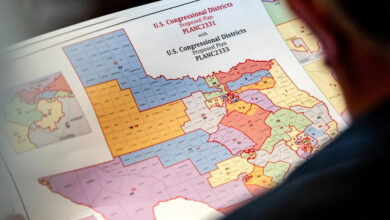Texas House Votes to Repeal Long-Unenforceable Ban on Same-Sex Relationships
House passes bipartisan bill to strike outdated ban from Texas law.

Two decades after the U.S. Supreme Court struck down Texas’ ban on same-sex relationships, the state’s House of Representatives took a historic step Friday to finally remove the law from its books.
By a 59-56 vote, the Texas House gave its approval to House Bill 1738, which would repeal a 1973 statute that criminalizes “deviate sexual intercourse with another individual of the same sex.” The law has been unenforceable since the Supreme Court’s 2003 decision in Lawrence v. Texas, but it has remained embedded in the state’s penal code.
The bill’s passage on its third and final reading marks the furthest any repeal effort has advanced since Lawrence. Previous efforts have stalled for decades—introduced in every session since at least 2005, and in some form since the 1980s. The legislation will now move to the Senate, where its future remains uncertain as the legislative session nears its June 2 close.
Rep. Venton Jones, D-Dallas, one of the first Black gay members of the Texas House, is leading the charge.
“Working on this bill has been a one-step-at-a-time process for so long,” Jones said Thursday. “I am standing on the shoulders of people who have carried this bill before me, and that’s where I get my strength.”
Jones, born in 1984, noted that repeal efforts date back to the year of his birth. Even as an unenforceable relic, the law stood as a powerful symbol of institutional discrimination, he said.
“Instead, I’m asking you to vote on a law that strengthens the fundamental civil liberties and individual freedoms that all Texans deserve,” he said. “I’m asking you to vote for a law that upholds the principles that Texans should have the freedom and ability to make their own private decisions without unwarranted government interference.”
Jones’ bill is narrower than past versions, removing the criminal provision but leaving untouched language stating that homosexuality “is not a lifestyle acceptable to the general public”—a phrase LGBTQ advocates hope to strike in the future.
Though Thursday’s 72-55 preliminary vote was largely along party lines, 12 Republicans joined all House Democrats to support the repeal, forming an unlikely bipartisan coalition. Among the GOP backers was Rep. Brian Harrison, R-Midlothian, a staunch conservative who co-authored the bill and has been known for criticizing fellow Republicans for insufficient ideological purity.
“Criminalizing homosexuality is not the role of government,” Harrison said. “I support repealing it because it’s consistent with limited government and individual liberty.”
Harrison noted that he and Jones often disagree, but emphasized that the bill reflects shared values around privacy and freedom.
“This might actually be the first bill we’ve brought to the floor that removes a law off our books,” he said.
Other Republicans voting yes included Reps. Jay Dean, Ryan Guillen, Sam Harless, Hillary Hickland, Ken King, Marc LaHood, John Lujan, Morgan Meyer, Dade Phelan, Ellen Troxclair and Denise Villalobos.
Several high-profile conservatives have also criticized the original law. U.S. Sen. Ted Cruz has said “government has no business in their bedrooms,” and Justice Clarence Thomas once called the ban “uncommonly silly.”
Despite its legal impotence, advocates argue that the continued presence of the law in the code could pose future risks. The recent rollback of Roe v. Wade in 2022 allowed Texas Attorney General Ken Paxton to resurrect a dormant 50-year-old abortion statute, raising concerns that other “zombie laws” might one day be revived under different judicial circumstances.
“There are no current cases before the Supreme Court threatening Lawrence, but Roe showed us what can happen when old laws are left on the books,” Jones said. “It was already past time to do this, and now even more so.”
Brad Pritchett, interim CEO of Equality Texas, praised the vote as a long-overdue milestone.
“When people hear the phrase ‘gay rights’ I think that can be confusing, because this is literally all we want—the privacy to live our lives in peace,” Pritchett said. “Today’s victory is no small feat. The passage of this bill in the House is a testament to the drive, dedication, and bipartisan determination of State Representative Venton Jones.”
The fate of HB 1738 now rests in the Texas Senate, where Lt. Gov. Dan Patrick has not weighed in publicly. With only weeks remaining before the session ends June 2, supporters hope the upper chamber will follow the House’s lead.










